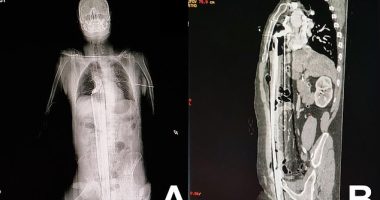Hormones are chemical messengers that travel throughout the body to control cells and coordinate organ functions. They’re a part of the endocrine system—the system responsible for driving things like metabolism, energy levels, growth and development, reproduction, mood, and stress response, per the Cleveland Clinic.
“Hormones are produced in the endocrine glands and they travel through the bloodstream to do their job elsewhere in the body,” says Rekha Kumar, MD, an endocrinologist, chief medical officer at Found, and former American Board of Obesity Medicine medical director. Hormones responsible for reproduction are also produced in the ovaries and testicles.
Experts In This Article
Want to learn a little more about how these important messengers work, and what happens when things go awry? Let’s take a dive into your hormone system.
In This Article
What are the main types of hormones?
The body produces at least 50 different kinds of hormones, but the main types include the following, per Johns Hopkins Medicine:
- Cortisol: A hormone made in the adrenal glands that reduces inflammation, maintains blood sugar and blood pressure levels, and maintains salt and water balance. It’s often called the “stress hormone” because it’s released when you’re stressed.
- Estrogen and progesterone: Hormones made in the ovaries. They drive sexual development and control the function of the uterus and breasts.
- Growth hormone: Sometimes called GH for short, this hormone drives growth and development. It’s made in the pituitary gland.
- Insulin: A hormone that brings sugar from your bloodstream into your cells, where it can be used for energy. It also stimulates fat and protein metabolism, and it’s made in the pancreas.
- Testosterone: A hormone made in the testicles that helps drive sexual development.
- Thyroxine: A hormone made by the thyroid and pituitary glands. It controls metabolism and nervous system activity.
Other types include melatonin (for sleep), epinephrine and norepinephrine (for heart rate and blood pressure), oxytocin and prolactin (for breast or chestfeeding), among many more, per Johns Hopkins Medicine.
How does the hormone system work?
Now that you know what hormones are, you may be wondering what they do. The hormone or endocrine system is a group of glands and organs that control hormone production. They keep constant tabs on how much of any given hormone is currently in your bloodstream and release more as needed, explains the Cleveland Clinic.
Structurally, the endocrine system is made up of the following, per the Cleveland Clinic:
- Adrenal glands
- Adipose tissue (body fat)
- Hypothalamus
- Ovaries
- Pancreas
- Pineal gland
- Pituitary gland
- Testicles
- Thyroid and parathyroid glands
These glands and organs release hormones throughout your body to help maintain certain bodily processes like digestion, blood sugar levels, reproduction, and more.
What medical conditions affect your hormones?
You can develop health problems if your body goes through certain hormonal changes—i.e., starts making too much or too little of a certain hormone. “A hormone could either not be doing its job properly or it could be doing too much of its job, causing an underreaction or an overreaction that can lead to symptoms,” Dr. Kumar says.
While it’s normal for hormones to go up and down in certain instances (like during menstruation, pregnancy, and menopause, for example), hormones that are consistently out of whack can indicate a health issue.
There are literally dozens of hormone-related diseases and conditions. Here’s a quick rundown of some of the most common, per the National Institute of Diabetes and Digestive and Kidney Diseases (NIDDK):
- Thyroid problems: Hyperthyroidism (where the thyroid makes too much thyroid hormone) and hypothyroidism (where the thyroid makes too little thyroid hormone) are among the most common hormone problems, Dr. Kumar says. An over- or under-active thyroid can lead to unexpected weight changes, sluggishness or restlessness, trouble maintaining body temperature, and other symptoms.
- Diabetes: This condition happens when your body doesn’t make enough insulin or can’t use it effectively. That causes too much blood sugar to build up in your bloodstream.
- Cushing’s syndrome: When the adrenal glands make too much cortisol, a person may have Cushing’s syndrome. Symptoms tend to come on slowly and can include unintended weight gain, a round face, easy bruising, and increased fat around the neck or shoulders.
- Fertility problems: Polycystic ovary syndrome (PCOS) happens when the ovaries or adrenals produce too much androgen hormones, which can lead to irregular periods and excess facial hair. Estrogen and progesterone imbalances can also affect the menstrual cycle and make it harder to get pregnant.
Hormone disorders are typically diagnosed by an endocrinologist. “The tricky thing about hormone imbalances is that symptoms can mimic many different conditions. It takes a hormone expert to get to the root cause,” Dr. Kumar says. Your endocrinologist can consider your symptoms and health history and order specific tests (like blood tests) to check your hormone levels and figure out what’s going on.
How to treat hormonal issues
If you have a hormone disorder that’s causing symptoms, you and your endocrinologist can decide on the best way to treat it. Specific therapies will depend on your diagnosis, of course. But in general, the treatment will involve something that brings your hormones back into the normal range, Dr. Kumar says. This could include the following:
- Medication, aka, hormone replacement therapy—either in pill or injection form
- Surgery
- Radiation therapy
Mild hormone imbalances don’t always need to be treated right away. “If something is slightly out of range, we may be able to monitor it or address it with lifestyle interventions,” says Dr. Kumar. By that, she really just means doubling down on basic healthy habits like:
- Eating a wholesome diet: Getting plenty of fruits, veggies, whole grains, lean protein, and healthy fats is sufficient; don’t believe all the “hormone-balancing diet” hype you see on social media! If you’re ever unsure, ask your doctor.
- Getting regular exercise: Just 30 minutes per day of moderate-intensity exercise can affect your hormone health, and overall health, in a positive way, per the Centers for Disease Control and Prevention (CDC).
- Limiting your alcohol intake: One drink (or less) in a day is considered moderate, per the CDC. In general, less is best.
- Getting enough sleep: Aim to get at least 7 to 8 hours per night, per the CDC.
- Managing your stress: Find relaxing activities you enjoy, like meditating, yoga, journaling, etc.
- Limiting exposure to hormone-disrupting chemicals (i.e., endocrine disruptors): These can be found in certain cleaning products, cosmetics, pesticides, and plastics, according to the National Institute of Environmental Health Sciences.
“Doing those things allows the body to be in a daily rhythm that it recognizes as normal, so your hormones will signal at optimal levels,” she adds.
Keep in mind, too, that some hormone issues might resolve when you address specific things that can throw them out of whack. Stress is a biggie, but long-term use of certain medications, like steroids, can also factor in here, according to the Cleveland Clinic.
When to see a doctor
The symptoms of hormone problems are often vague and tend to creep up over time (think: subtle weight changes or the sense that you don’t have as much energy as you used to). Anytime you notice a shift in your “normal,” try to keep tabs on it to see where it goes. “If your symptoms persist for weeks or months despite mild adjustments in lifestyle, you should see a specialist,” Dr. Kumar recommends.
You should also go to your doctor with any sudden symptoms, like heart palpitations, trouble breathing, new or worsening pain, or significant changes to your period or weight.
FAQ
What hormones are released during sex?
Your hypothalamus (a small gland in your brain) pumps out oxytocin when you’re aroused or have an orgasm (or even just when you hug or cuddle). It’s an instant mood booster that promotes feelings of relaxation and trust, which is one of the reasons why you typically feel so connected to your partner after sex, says Harvard Health Publishing. Oxytocin is also considered a happy hormone, along with dopamine, serotonin, and endorphins, per Harvard Health Publishing.
What are bio hormones?
Bio, or bioidentical, hormones are synthetic hormones similar to the ones your body naturally makes, per the Cleveland Clinic. They’re often used to treat disorders where the body doesn’t make enough of a certain hormone, like hypothyroidism.
What hormones are released during exercise?
Workouts bump up your body’s level of endorphins. These hormones, which are made by your hypothalamus and pituitary gland, are released in response to pain or stress (like when you’re pushing yourself hard during a run) to help you feel better, according to the Mayo Clinic. That’s why you get a mood boost from exercising!
Source: Well and Good









